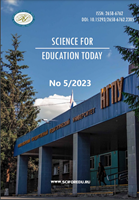Особенности становления социально-культурной активности дошкольников как условия когнитивно-эмоционального развития в новом цифровом обществе
Peculiarities of forming preschoolers’ socio-cultural agency as a condition for their cognitive- emotional development in the digital society
Author(s): Yulia Valerievna Batenova, Sergey Vladimirovich Tipushkov, Oksana Gennadievna FilippovaSubject(s): Preschool education, Adult Education, Educational Psychology, Cognitive Psychology, Sociology of Education, Pedagogy
Published by: Новосибирский государственный педагогический университет
Keywords: Social agency; Cultural practices; Synergetic approach; Event-based educational space; Cognitive-emotional development; Social-transformative activity; Digital era; Event-based education techniques; J
Summary/Abstract: Introduction. The article presents a theoretical review and an experimental study of preschoolers’ cognitive and emotional development in the digital era. The purpose of the research is to identify and clarify the synergetic effect of creating an event–organized educational space for joint activities of children and adults in the implementation of a complex of various types and forms of cultural practices aimed at developing agency and initiative in preschool children within the framework of socially transformative activities in digital society. Materials and Methods. The study follows the basic principles of the synergetic approach. In order to obtain empirical data, the following methods and techniques of psychological assessment were used: (1) structured observation of children’s joint activities, (2) social emotions inventory, and (3) G. A. Uruntayeva and Yu. A. Afonkina’s ‘Studying the effectiveness of social and personal motive’ inventory. The sample consisted of 56 preschoolers. In order to detect the randomness of the results and track the dynamics, the experimental data were subjected to mathematical processing (Wilcoxon's Ttest, which ensures the validity and reliability of the results obtained). Results. The research findings show that the use of a synergetic approach and a complex of various types and forms of cultural practices, such as a creative workshop, a research quest, game simulation modeling, design, collecting, and studio work have a significant impact on the indicators of older preschool children’s social agency as a condition for their cognitive and emotional development. The study confirms the assumption that achieving a high level of preschoolers’ social agency is possible provided that an event-organized space of joint activities of children and adults is created in the educational process of the kindergarten. Conclusions. The article concludes about the effectiveness of the synergetic approach in the implementation of a set of different types and forms of cultural practices as conditions for preschoolers’ cognitive and emotional development in the new digital society. The authors emphasize that the use of a synergetic approach and a set of cultural practices in educational practice increases the level of initiative, independence, and responsibility in children, and contributes to redirecting their attention from digital devices to the peer-group and developing positive relationships based on verbal communication and cooperation between peers and adults through the amplification of the creative experience of cognition, application the surrounding objects in a new quality and transforming them.
Journal: Science for Education Today
- Issue Year: 13/2023
- Issue No: 5
- Page Range: 158-178
- Page Count: 21
- Language: Russian

